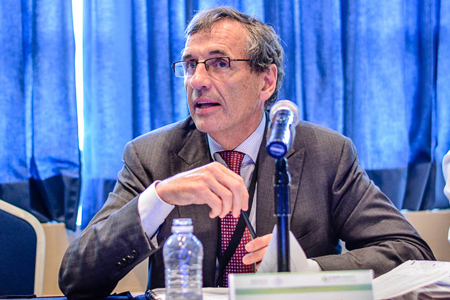Sustainable agriculture practices must be widely implemented in order to stem an alarming loss of biodiversity and to protect endangered species.

This is according to the “Standards and Biodiversity” report released recently by the International Institute for Sustainable Development (IISD).
Agricultural production currently accounts for 40 per cent of global land surface and is responsible for 70 per cent of projected losses in terrestrial biodiversity due to widespread land conversion, pollution and soil degradation.
“What happens in agriculture matters,” said Scott Vaughan, President/CEO, IISD. “Growing demand for certified products presents a major opportunity to protect our natural resources. The market is rewarding efforts to conserve critical habitats, protect soil and water quality, and mitigate the impacts of climate change. But market forces are not enough.”
The market value of certified agricultural products was estimated to be $52.5 billion in 2015 for eight major commodities (bananas, cotton, coffee, cocoa, tea, sugar, palm oil and soybeans) according to Standards and Biodiversity. That is up from $31.6 billion in 2012, the previous estimate by the “State of Sustainability Initiatives Review”.
Two other major commodities – fisheries and forestry – also registered significant growth, according to the new estimates. The sustainable forestry market grew to $231.8 billion in 2015 from $200.3 billion in 2012. The sustainable fisheries market grew to $8.9 billion in 2015 from $6.8 billion in 2012. The total trade value of the top 10 sustainable commodity markets grew to $293.2 billion in 2015 from $238.7 billion in 2012.
Some agricultural commodity markets are now dominated by sustainability standards. Half of global coffee production was standards-compliant in 2014 (the latest available data,) along with 30 per cent of cocoa production, 22 per cent of palm oil production and 18 per cent of global tea production.
The study forecasts that four other agricultural commodities – bananas, cotton, sugar and soybeans – will have compliance rates of at least 10 per cent by 2020.
However, standards remain a negligible force across global agricultural production as a whole. If those eight agricultural commodities became 100 per cent certified, the study found it would still only amount to 12 per cent of global agricultural land area.
“If voluntary standards are to play a major role in reducing the impacts of agriculture on biodiversity loss, they will have to, at a minimum, establish a significant presence among other crops – most notably, staple crops such as wheat, maize and rice,” said study author Jason Potts, a senior associate at IISD.
“The good news is that we can build political will to address biodiversity loss,” Potts added. “Parties of the UN’s Convention on Biological Diversity (CBD) are leading efforts to identify concrete solutions and immediate actions to achieve their biological diversity targets.”
The IISD study builds upon the CBD’s Biodiversity Impact Indicators for Commodity Production (BIICP), which identifies a core set of biodiversity indicators that can help governments and the agricultural industry understand how best to reduce negative impacts on biodiversity. The CBD Secretariat contributed to the development of the report.
“Voluntary sustainability standards are an important element of the necessary policy mix to redirect funding towards sustainable production practices and reducing biodiversity loss,” said Dr. Cristiana Paşca Palmer, Executive Secretary, CBD. “This report makes an important contribution by providing a better understanding of the role and potential of different voluntary sustainability standards, and what policy-makers can do to promote their wider application and their more robust integration into overall policy frameworks.”
The study was released at ISEAL Alliance’s annual meeting – the 2017 Global Sustainability Standards Conference – in Zurich, Switzerland. It identifies a wealth of information about specific commodities, such as:
- Cocoa certification appears to be well positioned to promote improved soil fertility where it matters most through a strong presence in countries facing soil fertility challenges.
- Coffee certification appears to be well positioned to limit the negative impacts on lakes and other water sources because standards are highly active in areas where the threat of eutrophication is most prominent.
- The banana sector may be approaching a “glass ceiling” on growth, as it is currently limited to the small portion of production that is traded internationally.
- Cotton certification appears to be under-represented in countries where cotton-related water use is most problematic: the expansion of certified cotton across Pakistan and India is strategically important.
- Palm oil certification is geographically focused where forest conversion is most problematic but may nevertheless have limited impact due to the scale of demand for conventional palm oil by Asian countries.
- Soy certification is most active in key areas of biodiversity vulnerability but has low adoption rates due to low demand for certified soy from Asia.
- Sugarcane certification is highly concentrated in Brazil, which has lower per-volume fertiliser use than other major producing countries. India, China, Pakistan and Mexico represent strategic opportunities for the expansion of certified sugarcane aimed at protecting water quality.
- Tea production compliant with standards accounts for 18 per cent of global tea production (by volume) but only 13 per cent of global area under tea production, as it appears to be concentrated in higher-yielding production systems.
